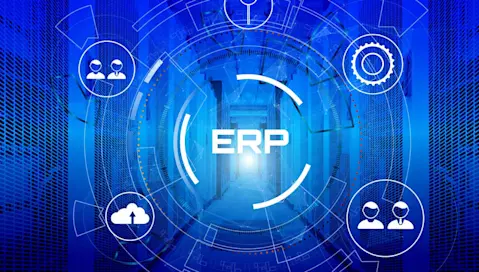Destacado en este post
ERP System Examples
ERP System Examples
Oct 19, 2021
Aptean Staff Writer
Let's start with the obvious question: what is ERP?
ERP stands for enterprise resource planning.
And an ERP is "a modular software system designed to integrate the main functional areas of an organization's business processes into a unified system," according to SearchERP.
Basically, an ERP system puts all of your organization's information into a single source of truth—not only is this good for organizational purposes, but this allows for complete visibility into business operations, encourages collaboration and inspires open communication.
When you use an ERP, you eliminate the need for many disparate systems where information can easily be lost or forgotten or mismanaged. Instead, all your data is centralized into a unified solution.
ERP is available from a wide range of vendors and is essential for manufacturers across all industries, including food and beverage, processing, discrete, equipment, distribution, retail and any industry in between.
There are many types of ERP, and ERP system examples can be categorized in several different ways—by the size of the solution or the market share of the supplier; by the specific vertical industry that the system is designed to support; or according to the technology platform it runs on.
Categorizing ERP Systems by Size
There are a small handful of large, multi-million dollar ERP providers that cater to an audience of other massive, multi-million dollar operations. With their market-share size, these two behemoths—SAP and Oracle—stretch the gambit of products and customers but often lack the specific industry knowledge and customer support and services most companies look for.
There are many other providers, however, who can offer similar functionalities of these two, but because they're smaller, they manage more niche businesses, take care of all their work in-house and function with their customer's specific needs as a central working point.
Categorizing ERP Systems by Industry
Distribution
There are a few distinguishing factors that separate a distribution ERP from an average ERP.
Supply chain visibility is essential. You need to know where your goods are every step of the way—that way, you can forecast product demand, communicate with your trading partners, calculate your true landed costs and manage your shipping and transportation logistics.
A genuinely robust distribution ERP should be able to successfully manage shipping goods directly from your supplier to your customer and chargebacks, as well as break down customer allowances, royalties and commissions. Aptean has the distribution ERP you're looking for.
Food & Beverage
The food and beverage industry is a tough one. There are so many verticals within the industry, and in this instance, one size certainly does not fit all.
The solutions must be precise, must provide the visibility and efficiency necessary to ensure product safety. There must be traceability and complete recall functionality. Because let's face it: each industry has its unique challenges. You want a software solution (and a partner) with the toolkit to help you navigate the complexity of your segment.
Aptean offers industry-specific ERP software for many different food and beverage segments:
You have a lot of options when it comes to food and beverage ERP software. Don't settle for cookie-cutter.
Manufacturing
There are two major divisions within manufacturing regarding industry applicability: discrete and process, though many products have been adding capabilities to bridge the gap and serve both markets.
Initially, ERP evolved to support the "discrete" side of manufacturing—companies that deal with hard goods fabricated and assembled from individual parts. When you break it down to its essential parts: discrete manufacturer's products come from or can be made into other products—they're a part of a larger or smaller whole. Some discrete manufacturing products might include automobiles or computers or medical devices.
Specific discrete manufacturing industries benefit from ERP solutions designed to support industry-specific needs. Here at Aptean, we have solutions based on industry specialty: computers and electronics, electrical equipment, fabricated metals and transportation equipment.
The process side of manufacturing, working with materials and products containing liquids and powders (such as chemicals or food and beverage manufacturers), soon thereafter demanded ERP solutions specifically designed to support their needs.
Aptean offers industry-specific ERP software for many different process manufacturing segments:
More recently, discrete-oriented ERP solutions continue to add process capabilities (the ability to handle "recipes," potency, continuous processing schedules, product grading, etc.).
Categorizing ERP Systems by Technology
There used to be a significant division in ERP solutions based on the operating environment (hardware, operating system, database, etc.) in which they functioned.
That's not really the case anymore. So much of that distinction has disappeared or become irrelevant with the near-universal adoption of cloud-based architecture. Most companies are offering software as a service, or SaaS. When we talk about SaaS, we mostly mean that your ERP lives in the cloud and offers a subscription fee instead of a license fee.
With a cloud ERP, the customer pays a subscription fee, and the vendor hosts and manages all of that customer's data for them. Because of ease-of-use, scalability, functionality, and many more reasons, more businesses are choosing to harness the power of the cloud.
One of the major technology players here is Microsoft Dynamics. More and more ERPs are leveraging the Microsoft Dynamics platform to build industry-specific functionality. Most of our Food and Beverage ERPs do.
Nevertheless, ERP solutions can be categorized by server platform and database, although many solutions can be implemented in several environments. For example, versions of SAP's products operate primarily UNIX or Windows/Intel platforms. Many of Infor's products use the IBM Power Systemi (AS/400) platform and integral DB2 database (Infor XA, Infor LX, Infor Prism, Infor System21). Still, other Infor products reside on WinTel platforms (VISUAL, Syteline).
Database system tends to be one of the more significant differentiators, but many products have a choice in their database, most often electing Oracle or SQLServer (Microsoft).
Many ERP buyers prefer to limit the number of technology suppliers they want to deal with, simplifying their processes, support and maintenance tasks. Microsoft is the winner in those accounts. Companies almost inevitably standardize on Microsoft Office products, prefer the Microsoft SQLServer database, and gravitate toward an "all Microsoft" solution, including the platform for their ERP system.
The Aptean Advantage
Shopping around for an ERP solution is stressful. There's a lot to consider, and you have a lot of ERP systems to compare. You can shop based on size, industry and technology.
And if you're looking for a company that can offer you specificity in all three. Well, that's us.
At Aptean, we don't try to put a round peg in a square hole. Your business is unique. Your software should be just as unique. We've created enterprise software solutions that cater to your needs precisely—no matter your industry or vertical.
Finding the right ERP is just step one. Step two is implementation. Don't worry, though. With us, you have a partner for the long haul. And we're with you every step of the way.
Ready to talk about an ERP that works for you? Reach out, now.
¿Todo listo para transformar tu negocio?
Tenemos el software especializado en tu sector que ayudará a tu organización a prosperar.



